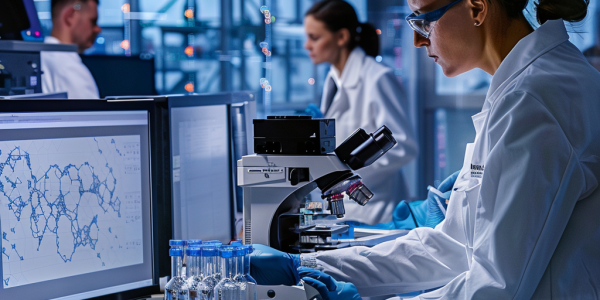Revolutionizing Chemical Processes: The Promise of Liquid Metals
Researchers at the University of Sydney are pioneering the use of liquid metals to revolutionize chemical processes, aiming to reduce industrial emissions and energy consumption. This innovative approach could transform the chemical manufacturing landscape, addressing a significant contributor to global greenhouse gas emissions. Discover how this groundbreaking research could pave the way for greener and more sustainable chemical reactions.
Illinois Researchers Develop Eco-Friendly Method for Sustainable Chemical Production
Researchers at the University of Illinois Urbana-Champaign have pioneered a sustainable method combining light and enzymes to produce high-value chemicals. This eco-friendly approach, highlighted in the journal Science, leverages fluorine to enhance olefins used in various industries, including agrochemicals and pharmaceuticals. Led by Huimin Zhao, the study promises to revolutionize chemical production while minimizing environmental impact.
Breakthrough Method Developed to Decompose Toxic ‘Forever Chemicals’ Efficiently
Researchers at Ritsumeikan University have developed a groundbreaking method for decomposing toxic ‘forever chemicals’ (PFAS) using semiconductor nanocrystals. This innovative technique can completely break down harmful substances in just hours at room temperature, offering a promising solution to environmental pollution and health risks associated with PFAS. The method not only detoxifies but also recovers fluorine ions for industrial reuse, marking a significant advancement in environmental science.
Study Reveals Dangers of Nanoplastics and Forever Chemicals on Infant Health
A groundbreaking study from The University of Texas at El Paso reveals the harmful effects of nanoplastics and forever chemicals on human health, particularly concerning infant nutrition. The research highlights significant alterations in essential proteins like beta-lactoglobulin, raising alarms about the safety of breast milk and infant formulas. These findings underscore the urgent need for regulatory measures and public awareness regarding the presence of these harmful substances in everyday products.
Reports of ‘Teflon Flu’ on the Rise in the US
Learn about the rise in cases of polymer fume fever linked to nonstick pans in the US. Find out how to safely use nonstick pans and why bird owners should be cautious. Get expert advice and tips for living well every day.
Scientists propose more effective method to remove organic pesticides from drinking water
Water scientists propose a more effective method of removing organic pesticides from drinking water, reducing health risks. By reducing the size of powdered activated carbon particles, a 75 percent reduction in the amount of powder required to eliminate pesticides was achieved, leading to cost savings and improved water treatment.
Study Reveals Link Between ‘Forever Chemicals’ and Heart Health in Postmenopausal Women
A recent study by the University of Illinois Urbana-Champaign reveals the potential impact of ‘forever chemicals’ known as PFAS on the heart health of postmenopausal women. Lead researcher Alicia Arredondo Eve highlights the correlation between PFAS exposure and increased risk of cardiovascular diseases in this demographic. The study emphasizes the need for further research to understand the biological mechanisms and develop targeted interventions to mitigate risks.
Revolutionary Vortex Fluidic Device Creates Gold Nanoparticles Without Harmful Chemicals
Researchers at Flinders University in South Australia have developed a groundbreaking method to create gold nanoparticles using a vortex fluidic device without harmful chemicals. This innovative approach not only produced nanoparticles but also revealed a contact electrification reaction in water, generating hydrogen and hydrogen peroxide. The environmentally friendly and efficient process offers potential applications in various fields such as drug delivery, catalysis, sensing, and electronics.
Study Links Prenatal Exposure to Endocrine-Disrupting Chemicals to Increased Risk of Metabolic Syndrome in Children
A recent study by the Barcelona Institute for Global Health found a concerning link between prenatal exposure to endocrine-disrupting chemicals (EDCs) and an increased risk of metabolic syndrome in children. The research, published in JAMA Network Open, highlights the potential long-term health implications of EDC exposure and emphasizes the need for further research and public health initiatives to address these risks.
AI Model Identifies Over 500 Toxic Chemicals in E-Liquids for Vaping
Researchers have utilized an AI model to identify over 500 toxic chemicals in e-liquids used for vaping, highlighting the hidden dangers associated with vaping. The study emphasizes the need for a deeper understanding of the health risks posed by inhaling complex e-liquids, especially after the 2019 vaping-related lung injuries outbreak. By analyzing 180 flavor chemicals commonly found in e-liquids, researchers employed a neural network model and experimental mass spectrometry data to assess the potential risks associated with these compounds. This groundbreaking research underscores the importance of ongoing studies to uncover the long-term health effects of vaping and promote safer vaping practices.










